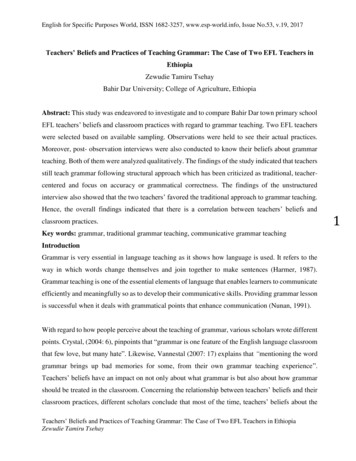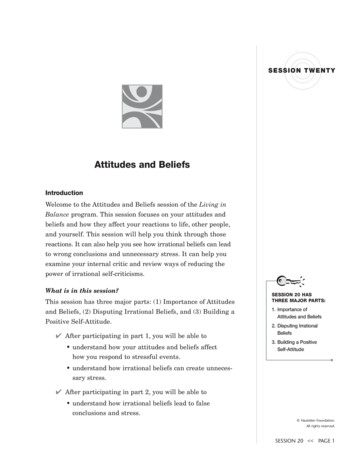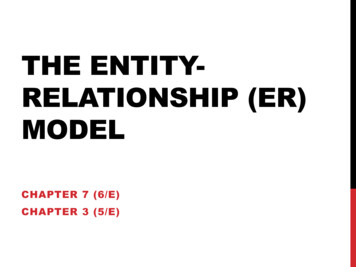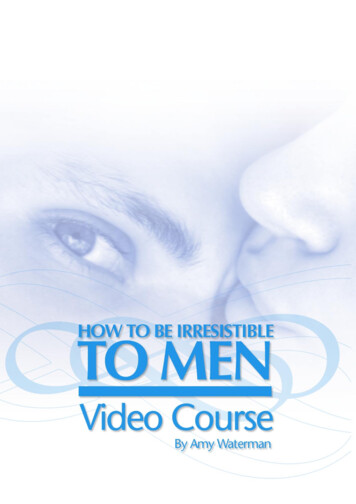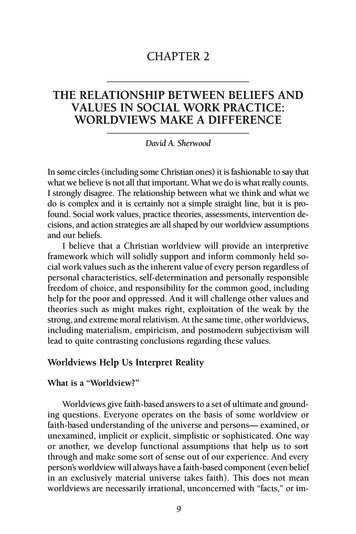
Transcription
CHAPTER 2THE RELATIONSHIP BETWEEN BELIEFS ANDVALUES IN SOCIAL WORK PRACTICE:WORLDVIEWS MAKE A DIFFERENCEDavid A. SherwoodIn some circles (including some Christian ones) it is fashionable to say thatwhat we believe is not all that important. What we do is what really counts.I strongly disagree. The relationship between what we think and what wedo is complex and it is certainly not a simple straight line, but it is profound. Social work values, practice theories, assessments, intervention decisions, and action strategies are all shaped by our worldview assumptionsand our beliefs.I believe that a Christian worldview will provide an interpretiveframework which will solidly support and inform commonly held social work values such as the inherent value of every person regardless ofpersonal characteristics, self-determination and personally responsiblefreedom of choice, and responsibility for the common good, includinghelp for the poor and oppressed. And it will challenge other values andtheories such as might makes right, exploitation of the weak by thestrong, and extreme moral relativism. At the same time, other worldviews,including materialism, empiricism, and postmodern subjectivism willlead to quite contrasting conclusions regarding these values.Worldviews Help Us Interpret RealityWhat is a “Worldview?”Worldviews give faith-based answers to a set of ultimate and grounding questions. Everyone operates on the basis of some worldview orfaith-based understanding of the universe and persons— examined, orunexamined, implicit or explicit, simplistic or sophisticated. One wayor another, we develop functional assumptions that help us to sortthrough and make some sort of sense out of our experience. And everyperson’s worldview will always have a faith-based component (even beliefin an exclusively material universe takes faith). This does not meanworldviews are necessarily irrational, unconcerned with “facts,” or im9
10David A. Sherwoodpervious to critique and change (though they unfortunately might be).It matters greatly how conscious, reflective, considered, or informedour worldviews are. The most objectivity we can achieve is to be critically aware of our worldview and how it affects our interpretations of“the facts.” It is far better to be aware, intentional, and informed regarding our worldview than to naively think we are (or anyone else is) objective or neutral or to be self-righteously led by our biases which wemay think are simply self-evident truth.These worldviews affect our approach to social work practice, howwe understand and help people. What is the nature of persons—biochemical machines, evolutionary products, immortal souls, all of the above?What constitutes valid knowledge—scientific empiricism only, “intuitive”discernment, spiritual guidance (if so, what kind)? What kinds of socialwork theories and practice methods are legitimate? What are appropriatevalues and goals—what is healthy, functional, optimal, the good?Worldviews and the Hermeneutical Spiral: A Beginning PlaceI like to use the concept of the “hermeneutical spiral” (the term is notoriginal with me, cf. Osborne, 1991, Wood, 1998). We always come to theworld, including social work practice, with our faith(worldview assumptions)—wherever we got it, however good or bad it is, and however embryonic it may be. This worldview faith strongly affects what we perceive (oreven look for). But the world (God’s creation, in the Christian worldview)is not a totally passive or subjective thing. So, we run the risk of comingaway from any encounter with the world having our faith and our categories somewhat altered, perhaps even corrected a bit. Then we use that altered faith in our next encounter with the world.So, for me, the starting place for integration of my beliefs and socialwork practice is always at the level of basic faith, worldview assumptions.What are the implications of my core beliefs? And what are the implications of the idea, theory, interpretation, or practice that I am examining? Touse a currently fashionable phrase, how do they “interrogate” each other?What kind of assumptions about the nature of the world lie behind Freudian theory? Behavioral theory? The scientific method? The strengths perspective? The social work belief that all persons have intrinsic value (aradical notion not particularly supported by modernism or postmodernismin their materialist, subjectivist versions)?To put it another way, we all form stories that answer life’s biggest questions. As I become a Christian, I connect my personal story to a muchbigger story that frames my answers to these big questions. For Christians,the biblical story of God’s nature and action in human history, culminating
The Relationship Between Beliefs and Values in Social Work11in Jesus Christ, is the “meta-narrative” that frames our personal stories andwithin which the meaning of our stories is rooted. Middleton and Walsh(1995, p. 11) summarize the basic worldview questions this way (with myillustrative additions):1. Where are we? What is the nature of the reality in which wefind ourselves? Is the nature of the universe meaningful or absurd? Created or accidental? Materialistic only, or also spiritual?2. Who are we? What is the nature and task of human beings?What does it mean to be a person? What is human life? Whatis its source and value? Is there such a thing as freedom orresponsibility?3. What’s wrong? How do we understand and account for eviland brokenness? And how do we account for our sense of morality, love, and justice? Is evil only stuff I happen not to prefer? Or are some things really good and other things reallywrong? Is love only lust or well-disguised self-centeredness?Does justice have a claim on us and what we call “ours”?4. What’s the remedy? How do we find a path through ourbrokenness to wholeness? What kinds of things will help? Dowe need a Savior or just a positive (or cynical) attitude? Willchemicals or incarceration do the trick?Interpreting the Facts“Facts” have no meaning apart from an interpretive framework.“Facts” are harder to come by than we often think, but even when wehave some “facts” in our possession, they have no power to tell us whatthey mean or what we should do.That human beings die is a fact. That I am going to die would seem tobe a reliable prediction based on what I can see. In fact, the capacity toput those observations and projections together is one of the ways wehave come to describe or define human consciousness. But what do these“facts” mean and what effect should they have on my life? One worldviewmight tell me that life emerged randomly in a meaningless universe and isof no particular value beyond the subjective feelings I may experiencefrom moment to moment. Another worldview might tell me that somehow biological survival of life forms is of value and that I only have valueto the extent that I contribute to that biological parade (with the corollarythat survival proves fitness). Another worldview might tell me that life isa gift from a loving and just Creator and that it transcends biological
12David A. Sherwoodexistence, that death is not the end of the story. Different worldviews lenddifferent meanings to the same “facts.”The major initial contribution of a Christian worldview to an understanding of social work values and ethical practice is not one ofunique, contrasting, or conflicting values. Rather, a Christian worldviewgives a coherent, solid foundation for the basic values that social workers claim and often take for granted (Holmes, 1984; Sherwood, 1993,2000). Subsequently, a Christian worldview will shape how those basicvalues are understood and how they interact with one another. For example, justice will be understood in the light of God’s manifest concernfor the poor and oppressed, so justice can never be defined only as aprocedurally “fair” protection of individual liberty and the right to acquire, hold, and transfer property (Lebacqz, 1986; Mott, 1982;Wolterstorff, 1983).The Interaction of Feeling, Thinking, and BehaviorPersons are complex living ecological systems—to use a helpful conceptual model common in social work—systems of systems, if you will.Systems within our bodies and outside us as well interact in dynamicrelationships with each other. For example, it is impossible to meaningfully separate our thinking, feeling, and behavior from each other andfrom the systems we experience outside ourselves, yet we quite properly think of ourselves as separate individuals. The lines of influencerun in all directions. What we believe affects what we experience, including how we define our feelings. For example, does an experience Imight have of being alone, in and of itself, make me feel lonely, or rejected, or exhilarated by freedom, for that matter? Someone trips me,but was it accidental or intentional? I have had sex with only one woman(my wife Carol) in over sixty years of life. How does this “make” mefeel? Are my feelings not also a result of what I tell myself about themeaning of my experience? But it works the other way too.All this makes us persons harder to predict. And it certainly makesit harder to assign neat, direct, and one-way lines of causality. The biblical worldview picture is that God has granted us (at great cost) thedignity and terror of contributing to causality ourselves through ourown purposes, choices, and actions. We have often used this freedom tohurt others and ourselves, but this also means that we are not mechanistically determined and that significant change is always possible. Andchange can come from many directions—thinking, emotions, behavior,experience. We are especially (compared to other creatures) both giftedand cursed by our ability to think about ourselves and the world. We
The Relationship Between Beliefs and Values in Social Work13can form purposes and act in the direction of those purposes. Our beliefs about the nature of the world, other persons, and ourselves interact in a fundamental way with how we perceive reality, how we defineour own identity, and how we act.If this is true in our personal lives, it is equally true as we try tounderstand and help our clients in social work practice. And it is no lesstrue for clients themselves. What we believe about the nature of theworld, the nature of persons, and the nature of the human situation is atleast as important as the sheer facts of the circumstances we experience.Worldviews Help Construct Our Understanding of ValuesCut Flowers: Can Values Be Sustained Without Faith?One significant manifestation of the notion that beliefs aren’t all thatimportant is the fallacy of our age which assumes that fundamental moralvalues can be justified and sustained apart from their ideological (ultimatelytheological) foundation. Take, for example, the fundamental Christian andsocial work belief that all human beings have intrinsic dignity and value.Elton Trueblood, the Quaker philosopher, once described ours as a“cut-flower” generation. He was suggesting that, as it is possible to cuta rose from the bush, put it in a vase, and admire its fresh loveliness andfragrance for a short while, it is possible to maintain the dignity andvalue of every human life while denying the existence or significance ofGod as the source of that value. But the cut rose is already dead, regardless of the deceptive beauty which lingers for awhile. Even uncut, “Thegrass withers, and the flower falls, but the Word of the Lord enduresforever” (I Peter 1:24-25).Many in our generation, including many social workers, are tryingto hold onto values—such as the irreducible dignity and worth of theindividual—while denying the only basis on which such a value canultimately stand. We should be glad they try to hold onto the value, butwe should understand how shaky such a foundation is. A secular generation can live off its moral capital only so long before the impertinentquestions (Why should we?) can no longer be ignored.Doesn’t Everybody “Just Know”That Persons Have Dignity and Value?But doesn’t everybody “just know” that human beings have intrinsic value? You don’t have to believe in God, do you? In fact, accordingto some, so-called believers in God have been among the worst offend-
14David A. Sherwooders against the value and dignity of all persons (sadly true, in somecases). After all, a lot of folks, from secular humanists to rocket scientists to New Age witches to rock stars, have declared themselves as defenders of the value of the individual. Isn’t the worth of the person justnatural, or at least rational and logically required? The plain answer is,“No, it’s not just natural or rational or something everyone just knows.”I received a striking wake-up call in regard to this particular truth anumber of years ago when I was a freshman at Indiana University. Ithink the story is worth telling here. I can’t help dating myself—it wasin the spring of 1960, the time the Civil Rights movement was clearlyemerging. We were hearing of lunch room sit-ins and Freedom Riderson buses. Through an older friend of mine from my home town I woundup spending the evening at the Student Commons talking with my friendand someone he had met, a graduate student from Iran named Ali. I wasquite impressed. My friend Maurice told me Ali’s father was some sortof advisor to the Shah (the ruling despot at that point in Iran’s history).The conversation turned to the events happening in the South, to theideas of racial integration, brotherhood, and social justice. Ali was franklypuzzled and amused that Maurice and I, and at least some other Americans, seemed to think civil rights were worth pursuing. But given that, hefound it particularly hard to understand what he thought was the wishywashy way the thing was being handled. “I don’t know why you want todo it,” he said, “but if it’s so important, why don’t you just do it? If I werePresident of the United States and I wanted integration, I would do it in aweek!” “How?” we asked. “Simple. I would just put a soldier with a machine gun on every street corner and say ‘Integrate.’ If they didn’t, I wouldshoot them.”Naive freshman that I was, I just couldn’t believe he was really saying that. Surely he was putting us on. You couldn’t just do that to people.At least not if you were moral! The conversation-debate-argument wenton to explore what he really did believe about the innate dignity andvalue of the individual human life and social responsibility. You don’tjust kill inconvenient people, do you? I would say things like, “Surelyyou believe that society has a moral responsibility to care for the widows and orphans, the elderly, the disabled, the emotionally disturbed.”Incredibly (to me at the time), Ali’s basic response was not to give aninch but to question my beliefs and values instead. “Society has no suchmoral responsibility,” he said. “On the contrary. You keep talking aboutreason and morality. I’ll tell you what is immoral. The rational personwould say that the truly immoral thing is to take resources away fromthe strong and productive to give to the weak and useless. Useless members of society such as the disabled and mentally retarded should be
The Relationship Between Beliefs and Values in Social Work15eliminated, not maintained.” He would prefer that the methods be “humane,” but he really did mean eliminated.It finally sunk into my freshman mind that what we were disagreeingabout was not facts or logic, but the belief systems we were using to interpret or assign meaning to the facts. Ali was a thoroughly secular man; hehad left Islam behind. If I were to accept his assumptions about the nature of the universe (e.g. that there is no God, that the material universe isthe extent of reality, that self-preservation is the only given motive andgoal), then his logic was flawless and honest. As far as he was concerned,the only thing of importance left to discuss would be the most effectivemeans to gain and keep power and the most expedient way to use it.In this encounter I was shaken loose from my naive assumptionthat “everybody knows” the individual person has innate dignity andvalue. I understood more clearly that unless you believed in the Creator, the notion that all persons are equal is, indeed, not self-evident.The Nazi policies of eugenics and the “final solution” to the “Jewishproblem” make a kind of grimly honest (almost inevitable) sense if youbelieve in the materialist worldview.The “Is-Ought” DilemmaNot long afterward I was to encounter this truth much more cogentlyexpressed in the writings of C. S. Lewis. In The Abolition of Man (1947) hepoints out that both the religious and the secular walk by faith if they try tomove from descriptive observations of fact to any sort of value statement orethical imperative. He says “From propositions about fact alone no practical conclusion can ever be drawn. ‘This will preserve society’ [let’s assumethis is a factually true statement] cannot lead to ‘Do this’ [a moral andpractical injunction] except by the mediation of ‘Society ought to be preserved’ [a value statement]” (p. 43). “Society ought to be preserved” is amoral imperative that no amount of facts alone can prove or disprove. Eventhe idea of “knowing facts” involves basic assumptions (or faith) about thenature of the universe and human beings. The secular person (socialworker?) tries to cloak faith by substituting words like natural, necessary,progressive, scientific, rational, or functional for “good,” but the questionalways remains—For what end? and Why? And the answer to this question always smuggles in values from somewhere else besides the facts.Even the resort to instincts such as self-preservation can tell us nothing about what we (or others)ought to do. Lewis (1947, p. 49) says:We grasp at useless words: we call it the “basic,” or “fundamental,” or “primal,” or “deepest” instinct. It is of no avail.
16David A. SherwoodEither these words conceal a value judgment passed upon theinstinct and therefore not derivable from it, or else they merelyrecord its felt intensity, the frequency of its operation, and itswide distribution. If the former, the whole attempt to base valueupon instinct has been abandoned: if the latter, these observations about the quantitative aspects of a psychological eventlead to no practical conclusion. It is the old dilemma. Eitherthe premise is already concealed an imperative or the conclusion remains merely in the indicative.This is called the “Is-Ought” dilemma. Facts, even when attainable,never have any practical or moral implications until they are interpretedthrough the grid of some sort of value assumptions. “Is” does not lead to“Ought” in any way that has moral bindingness, obligation, or authorityuntil its relationship to relevant values is understood. And you can’t get thevalues directly from the “Is.” We always comes down to the question—what is the source and authority of the “Ought” that is claimed or implied?The social work Code of Ethics refers to values such as the inherentvalue of every person, the importance of social justice, and the obligationto fight against oppression. It is a fair question to ask where those valuescome from and what gives them moral authority and obligation.A Shaky Consensus: “Sexual Abuse”or “Intergenerational Sexual Experience?”For an example of the “Is-Ought” dilemma, is child sexual abuse afact or a myth? Or what is the nature of the abuse? Child sexual abuse isan example of an area where there may seem to be more of a consensusin values than there actually is. In any event, it illustrates how it isimpossible to get values from facts alone. Some intervening concept of“the good” always has to come into play.Fact: Some adults have sexual relations with children. But so what?What is the practical or moral significance of this fact? Is this something weshould be happy or angry about? Is this good or bad? Sometimes good andsometimes bad? Should we be encouraging or discouraging the practice?Even if we could uncover facts about the consequences of the experienceon children, we would still need a value framework to help us discern themeaning or practical implications of those facts. And to have moral obligation beyond our own subjective preferences or biases, this value frameworkmust have some grounding outside ourselves. What constitutes negativeconsequences? And even if we could agree certain consequences were indeed negative, the question would remain as to what exactly was the cause.
The Relationship Between Beliefs and Values in Social Work17In the last few years there has been a tremendous outpouring ofattention to issues of child sexual abuse and its effects on adult survivors. I must say that this is long overdue and much needed. And evenamong completely secular social workers, psychologists, and other therapists there currently appears to be a high degree of consensus about themoral wrong of adult sexual activity with children and the enormity ofits negative consequences on the child at the time and in later life. As aChristian I am encouraged, especially when I recall the self-described“radical Freudian” professor I had in my master’s in social work program who described in glowingly approving terms high levels of sexualintimacy between children and each other and children and adults as“freeing and liberating” (that was the early 1970s).However, if I look more closely at the worldview faith underlyingmuch of the discussion of sexual abuse and its effects, the result is notquite so comforting to me as a Christian. The moral problem tends notto be defined in terms of a well-rounded biblical view of sexuality andGod’s creative design and purpose or an understanding of the problemof sin. Rather, it tends to be based on a more rationalistic and individualistic model of power and a model of justice that pins its faith on reason. Sexual abuse grows out of an inequity in power which a personrationally “ought not” exploit. Why not, one might ask.But what if we take away the coercive element and get rid of therepressive “body-negative” ideas about sexual feelings? What if muchor all of the negative effects of non-coercive sexual activity betweenadults and children is the result of the misguided and distorted socialattitudes which are passed on to children and adults? Defenders of “nonexploitive” sexual activity between adults and children can (and do)argue that any negative consequences are purely a result of sex-negativesocial learning and attitudes. Representatives of a hypothetical groupsuch as P.A.L. (Pedophiles Are Lovers!) would argue that what needs tobe changed is not the intergenerational sexual behavior, but the sexually repressive social values and behavior which teach children the negative responses. These values are seen as the oppressive culprits. Then,the argument might go, should we not bend our efforts to eradicatingthese repressive sexual values and attitudes rather than condemningpotentially innocent acts of sexual pleasure? Indeed, why not, if theonly problem is exploitation of power?You should also note that this argument in favor of intergenerationalsexual behavior is not exclusively scientific, objective, or based only on“facts.” It has to make faith assumptions about the nature of persons, thenature of sexuality, the nature of health, and the nature of values. By thesame token, my condemnation of adult sexual activity with children is
18David A. Sherwoodbased on faith assumptions about the nature of persons, sexuality, health,and values informed by my Christian worldview. It is never just “facts”alone that determine our perceptions, conclusions, and behavior.Right now, it happens to be a “fact” that a fairly large consensusexists, even among secular social scientists and mental health professionals, that adult sexual activity with children is “bad” and that it leadsquite regularly to negative consequences. Right now you could almostsay this is something “everyone knows.” But it would be a serious mistake to become complacent about this or to conclude that worldviewbeliefs and faith are not so important after all.First, not everyone agrees. Although I invented the hypotheticalgroup P.A.L. (Pedophiles Are Lovers), it represents real people and groupsthat do exist. The tip of this iceberg may be appearing in the professional literature where it is becoming more acceptable and common tosee the “facts” reinterpreted. In preparing bibliography for a course onsexual issues in helping, I ran across a very interesting little shift interminology in some of the professional literature. One article was entitled “Counterpoints: Intergenerational sexual experience or child sexualabuse” (Malz, 1989). A companion article was titled “Intergenerationalsexual contact: A continuum model of participants and experiences”(Nelson, 1989). Words do make a difference.Second, we shouldn’t take too much comfort from the apparent agreement. It is sometimes built on a fragile foundation that could easilycome apart. The fact that Christians find themselves in wholeheartedagreement with many secular helping professionals, for example, thatsexual activity between adults (usually male) and children (usually female) is exploitive and wrong may represent a temporary congruenceon issues and strategy, much more so than fundamental agreement onthe nature of persons and sexuality.But back to the “Is-Ought” dilemma. The fact that some adults havesexual contact with children, by itself, tells us nothing about what, ifanything, should be done about it. The facts can never answer thosequestions. The only way those questions can ever be answered is if weinterpret the facts in terms of our faith, whatever that faith is. What isthe nature of the world? What is the nature of persons? What is themeaning of sex? What constitutes health? What is the nature of justice?And most important—why should I care anyway?
The Relationship Between Beliefs and Values in Social Work19Worldviews Help Define the Nature and Value of PersonsSo—Worldviews Have ConsequencesYour basic faith about the nature of the universe has consequences(and everyone, as we have seen, has some sort of faith). Faith is consequential to you personally and the content of the faith is consequential. Ifit isn’t true that Christ has been raised, my faith is worthless (I Corinthians15:14). And if it’s true that Christ has been raised, but I put my faith inBaal or the free market or the earth goddess (big these days) or Karl Marx(not so big these days) or human reason, then that has consequences, tome and to others. What are we going to trust, bottom-line?In I Corinthians 15, the apostle Paul said something about the importance of what we believe about the nature of the world, the contentof our faith. He said, “Now if Christ is proclaimed as raised from thedead, how can some of you say there is no resurrection of the dead? Ifthere is no resurrection of the dead, then Christ has not been raised;and if Christ has not been raised, then our proclamation has been invain and your faith is also in vain . . . If Christ has not been raised, yourfaith is futile and you are still in your sins . . . If for this life only we havehoped in Christ, we are of all people most to be pitied” (12-14, 17, 19).I’ve been a student, a professional social worker, and a teacher ofsocial work long enough to see some major changes in “what everyoneknows,” in what is assumed or taken for granted. “What everyone knows”is in fact part of the underlying operational faith of a culture or subculture—whether it’s Americans or teenagers or those who go to college orsocial workers—or Southern Baptists, for that matter.When I went to college, logical positivism was king, a version ofwhat C. S. Lewis called “naturalism,” a kind of philosophical materialism. It said that the physical world is all there is. Everything is fullyexplainable by materialistic determinism. Only what can be physicallymeasured or “operationalized” is real (or at least relevantly meaningful). In psychology it was epitomized in B. F. Skinner’s behaviorism.I remember as a somewhat bewildered freshman at Indiana University attending a lecture by a famous visiting philosophy professor (alogical positivist) from Cambridge University (whose name I have forgotten) entitled “The Impossibility of any Future Metaphysic” (his takeoff on Kant’s title “Prolegomena to any Future Metaphysic”). I can’t sayI understood it all at the time, but his main point was that modernpeople must permanently put away such meaningless and potentiallydangerous ideas as spirituality, the supernatural, and any notion of values beyond subjective preferences. We now know, he said, that such
20David A. Sherwoodlanguage is meaningless (since not empirical) except, perhaps, to express our own subjective feelings.In a graduate school course in counseling, I had an earnest youngbehaviorist professor who had, as a good behaviorist, trained (conditioned)himself to avoid all value statements that implied good or bad or anythingbeyond personal preference. When faced with a situation where someoneelse might be tempted to make a value statement, whether regarding spaghetti, rock and roll, or adultery, he had an ideologically correct response.He would, with a straight face, say “I find that positively reinforcing” or,“I find that negatively reinforcing.” (I don’t know what his wife thoughtabout this kind of response). Notice, he was saying “I” (who knows aboutyou or anyone else) “find” (observe a response in myself at this moment;who knows about five minutes from now) “that” (a particular measurablestimulus) is “positively reinforcing” (it elicits this particular behavior nowand might be predicted to do it again).Above all, the idea was to be totally scientific, objective, and valuefree. After all, values were perceived to be purely relative, personal preferences, or (worse) prejudices induced by social learning. And “everyone knew” that the only t
unique, contrasting, or conflicting values. Rather, a Christian worldview gives a coherent, solid foundation for the basic values that social work-ers claim and often take for granted (Holmes, 1984; Sherwood, 1993, 2000). Subsequently, a Christian worldview will shape how those basic values are understood and how they interact with one another .



